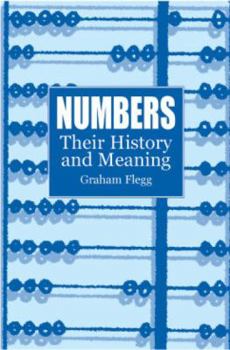Numbers: Their History and Meaning
Select Format
Select Condition 
Book Overview
Extremely readable, jargon-free book for general readers traces the evolution of counting systems, from the primitive techniques of antiquity to computers. Text examines the earliest endeavors to... This description may be from another edition of this product.
Format:Paperback
Language:English
ISBN:0486421651
ISBN13:9780486421650
Release Date:November 2012
Publisher:Dover Publications
Length:304 Pages
Weight:1.95 lbs.
Dimensions:0.6" x 6.3" x 9.3"
Customer Reviews
2 ratings
Interesting account
Published by Thriftbooks.com User , 16 years ago
The author took me for a trip down "memory lane" of like 2,000 years on how people have used mathematics, in this instance - number theory, throughout the ages from the European to the Hindu civilizations. The book also examines the different methods developed by different cultures to achieve the same goal, that is to be able to count stuff and its derivatives. I think this book is what is missing in our education system w.r.t math i.e. a historical understanding of the evolution of modern-day math; since most of us learn mathematics by rote and i dare say none of us wonder how did the math as we knew today came?
The synergistic co-development of math and civilization
Published by Thriftbooks.com User , 22 years ago
As humans moved from the hunter-gatherer lifestyle to the fixed position necessary for agriculture, the skills needed for survival changed. It became necessary to measure land and record yields so that taxes could be levied to support the government. This necessitated the development of formal mathematics, so the early history of mathematics is intertwined with the rise of civilization. As civilization advanced, more complex mathematics had to be invented to keep up with the changing conditions and to make the record keeping more accurate and efficient. Therefore, the history of mathematics is also a history of the rise of civilization in the form of cities and economics. Flegg does a good job in describing this synergy between the rise of humans as economic animals and the development of the new forms of mathematics needed to keep score. The numeration systems of the Babylonians, Egyptians and Mayans are examined and contrasted. He also explains the advantages and disadvantages of the different forms of numeric representations. Furthermore, he places the developments in the proper historical context, explaining why a new concept was so valuable and in some cases necessary for commerce to advance. In the modern world, we take abstract concepts such as place notation, negative numbers, the zero and fractions for granted and consider them routine. That has not always been the case, as for much of recorded history some of these ideas did not exist. Flegg explains the rise of these ideas in a manner that is bereft of complex jargon and so is accessible to the general reader. Teachers at all levels, from elementary to college, will find it useful as a resource for material in how numbers arose and were adapted to changing social and economic conditions.Published in Journal of Recreational Mathematics, reprinted with permission.






